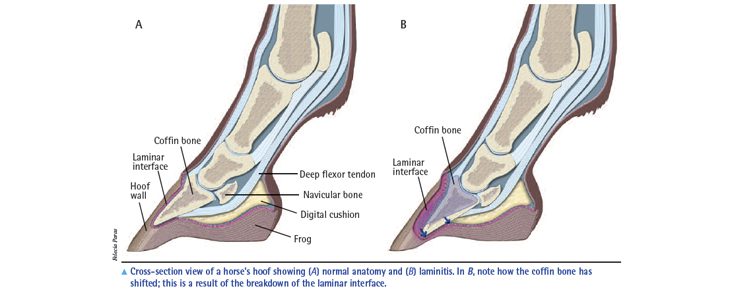What is Founder?:
Founder occurs due to the lack of blood flow in the laminae which produces inflammation in the hoof. As time goes by, the cells of the laminae are damaged due to the lack of oxygen and nutrients that are found in the blood. If the problem is not treated in the early stages of founder, the laminae will start to die and cause more problems along with pain. When the laminae die, the coffin bone can no longer support the weight of the horse. Sometimes the coffin bone can protrude through the sole, resulting in a possible irreversible case of lameness and excruciating pain.
Founder (aka laminitis) in horses is a very serious condition of the foot caused by the coffin bone rotating and pointing towards the horse’s sole. This is extremely painful and in some instances it may be necessary to euthanize the horse.

The Symptoms of Founder in Horses:
Founder can happen in any of hoof, but most often it happens in the front. Some of the most common signs and symptons of founder are:
- Sudden lameness
- Reluctance to walk or move
- Laying down more often
- Pulse felt in the foot Alternating weight from leg to leg Does not want to lift, bend, or raise a leg
- Warm/hot hoof
- Obvious pain when standing or moving
- Standing with front legs out in front of their body
- Movement or rotation of coffin bone
- Standing with both front and rear legs under their body
Types Of Founder:
- Acute founder is the sudden breakdown of the attachment between the hoof and the laminae (coffin bone)
- Chronic founder is the continuation of acute laminitis past the 72 hourmark
- Support-limb founder happens to the healthy hoof that must bear the weight of an injured hoof
The Causes of Founder:
- Feeding your horse large amounts of soluble carbohydrates could cause an overload of undigested sugars and starches
- High fever or illness that causes equine metabolic syndrome (EMS)
- Severe cases of colic such as stress from travelling, foaling, or changes in the horses environment
- Infections such as a severe bacterial infection can cause blood poisoning (toxemia) and founder
- Working too hard or fast for a long period of time
- Cushing’s disease is a pituitary gland disease that causes increased hunger, thirst, sweating, and weight loss… and possibly founder.

Diagnosis of Founder:
Be prepared to tell your veterinarian your horse’s medical history along with their vaccination history. This will give your vet a head start prior to a comprehensive physical and lameness examination which includes palpation of certain areas for pain, heat, and inflammation. A static flexion will also be done to check out the range of motion. The veterinarian will ask you to trot your horse off to observe the horse in motion. A hoof tester is used next to put pressure on certain areas of the foot to find the exact location. In addition, the veterinarian will need to get x-rays of the hoof to check the alignment of the coffin bone and may also do an ultrasound as well for a more detailed view.
Treatment of Founder in Horses Treatment of founder depends on the cause. The underlying problem must be treated at the same time to ensure success.
Medications To Be Used:
Your veterinarian will first administer a non-steroidal anti-inflammatory drug (NSAID) to relieve inflammation and pain. A thyroid supplement will be given only if your horse is found to have Cushing’s disease. Heel wedge Cuffs, heart bar shoes or foam supports can be used for support. Sole putty can be used from the heels to the tip of the frog to provide support to the frog.
Cold Therapy– A MUST:
The number one way to administer cold therapy is by immersing your horse’s hoof in ice water on and off for at least three full days. Twenty minutes in ice, then thirty minutes out and keep repeating. You will have to consistently replace the ice to keep the water temperature below 40 degrees Fahrenheit.

Absolute Stall Rest:
Keep your horse in a quiet stall with enough bedding to support the frog. Your veterinarian will most likely suggest this for at least one week to one month.
Surgery Options:
There are few options for surgery such are a hoof wall resection or deep digital flexor tenotomy.
Recovery of Foundered Horses:
The prognosis for a foundered horse is guarded. While some horses may be able to withstand the treatment or even heal on their own, others may never come sound and be in constant pain and therefore may need to be euthanized.
